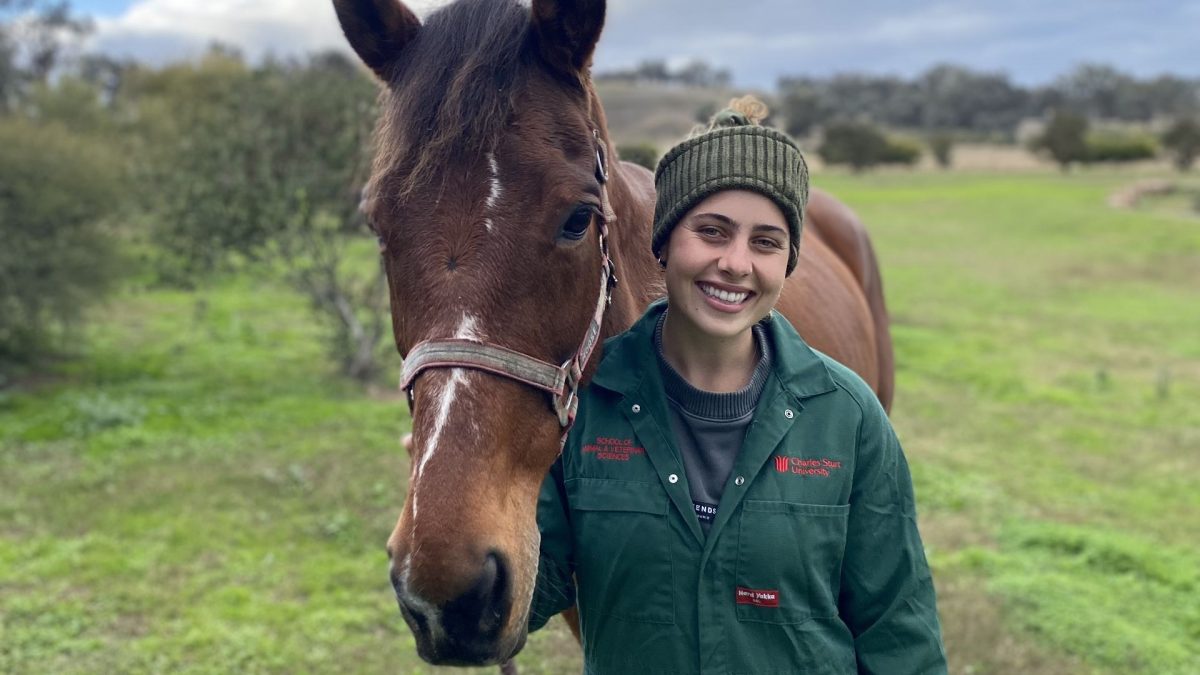
Mollie Buckley hopes her research will contribute to more ethical outcomes in the racing industry. Photo: Charles Sturt University.
Charles Sturt University student Mollie Buckley has set out to discover what makes a successful retired racehorse tick after identifying a gap in publicly available research.
A recent Bachelor of Equine Science graduate, Ms Buckley explained her research aimed to address common misconceptions about the behaviour of racehorses and improve outcomes for their retirement or new careers.
“Retired racehorses currently have a reputation for being ‘highly strung’ and difficult to manage,” Ms Buckley said.
“This may be true in cases where the horse is not matched well with its new owner, or it has been affected by poor animal welfare at some point in its life or received a poor amount of training for a new discipline,” the 23-year-old explained.
Ms Buckley is seeking participants for an online survey to identify physical and behavioural characteristics of thoroughbred and standardbred racehorses thriving in their post-racing lives or new careers.
The survey requests Australian horse owners who currently or have previously owned at least one retired racehorse to document their observations of their horse’s habits, like housing and management behaviours.
Owners will also answer questions regarding general demographics, the current discipline the horse is participating in, whether said discipline is competitive or recreational and the horse’s education history.
“Although many retired racehorses are involved in a wide range of non-racing disciplines and there is a definite market for them, little is understood about the factors that may or may not make them successful once they leave the racetrack,” Ms Buckley said.
She said her research will also identify whether these positive attributes can be supported while still actively participating in the racing industry to support a seamless transition from racing to retirement.
“When we understand these attributes, the results will help guide further research, which supports better welfare outcomes for racehorses throughout all stages of life,” she said.
Currently, the general public does not have access to such in-depth information that shows how these horses progress beyond the racetrack.
Ms Buckley explained that by the public having access to such information, the racing industry’s social license to operate would be challenged.
Retired racehorse welfare outcomes would also be brought into the spotlight, although this time backed by research.
Associate Professor Jane Williams and Ms Stephanie Evans from Hartpury University in the UK will collaborate with Ms Buckley’s supervisors at CSU’s School of Agricultural, Environmental and Veterinary Sciences, Dr Glenys Noble and Associate Professor Hayley Randle.
Professor Randle expressed her excitement to see the outcomes of Ms Buckley’s project, emphasising the importance of whole-of-life welfare for all horses.
“Several ex-racehorses have gone on to win medals for Australia at the Olympic Games and World Championships,” she said.
“They can definitely be successful in a second career.”
Dr Noble explained that not every horse has to represent Australia to be a success, revealing “thousands of racehorses participate in various off-the-track programs around Australia every week, and Mollie’s research will help improve these organisations’ success rates of matching horses with new owners.”
Dr Noble also explained the Australian racing industry’s current goals are centred around improving lifelong welfare standards and ensuring secure new homes for all racehorses coming off the track.
Molly hopes the Australian racing industry will utilise her research to assist its efforts to rehome racehorses and encourages all previous and current owners of retired racehorses to participate.
“Owning a retired racehorse can be a very rewarding experience,” Ms Buckley said.
The online survey is open for seven weeks and closes on Monday 25 July. It will take approximately 20 minutes to complete and participants can access it here.







